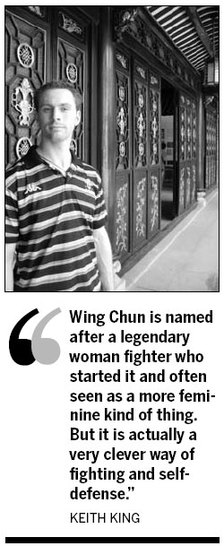Briton embraces the martial art of Wing Chun
Updated: 2011-11-27 07:49
By Alexis Hooi(China Daily)
|
|||||||||

Keith King has martial arts coursing through his veins. "I grew up with martial arts around me. My father practiced and taught jujutsu while my mother did judo. They would spar or train with each other," says King, who is from Portsmouth, England.
Fueled by his passion for martial arts, King decided to leave home for China, the birthplace of kungfu. That was 10 years ago when he was 21.
He ended up in Guangdong, the southern Chinese province famous for churning out kungfu legends like Ip Man, Huang Feihong and Bruce Lee, who ultimately showed the world the prowess of Chinese martial arts.
In Guangzhou, Guangdong's capital, King was introduced to Wing Chun, a martial art indigenous to the area and known for close-range combat.
"I bumped into a lot of bad quality martial arts instructors in my first year in China," King says.
"They knew only a bit and wanted to get money from foreigners."
Then he met his first Wing Chun teacher in Guangzhou's Haizhu district and never looked back.
"Three months into the training I was put into my first competition. I had to face fighters from a police team, but I won. Since learning Wing Chun I've never felt the need to learn any other art form," King says.
He later set up a martial arts studio with fellow Wing Chun practitioners and found himself facing up to 15 students a time. Everyone there was Chinese and about 70 percent of the students were women.
"Wing Chun is named after a legendary woman fighter who started it and was often seen as a more feminine kind of thing. But it is actually a very clever way of fighting and self-defense," he says.
"It doesn't rely on strength, which is very good because by Western standards I'm not a big guy. It relies on body mechanics like getting the right angles to generate more strength. It teaches you to know how the person is going to attack so that you know how to defend before they are going to attack." He says it has also taught him how to lead an opponent's attack and have more control in the encounter.
Wing Chun skills have stood King in good stead on at least two occasions. One was during a genuine bar brawl.
"It was then that I actually found out how good Wing Chun was. There was a foreign guy who started to beat a Chinese girl. I already had a few beers then and thought I'd play the hero," King says.
"So he attacked me and I punched him the same way I trained. I didn't think about it and I saw him fly back and I then I thought 'wow'. He comes back and this is why Wing Chun's good - he started swinging but we were in a bar. He was hitting everyone around except me."
In a separate occasion in Shenzhen, King says he found himself fending off a group of more than 10 attackers together with a friend.
"This was in a rough part of town and the people were drunk and didn't like foreigners. My friend was also doing all right against them because he's a boxer," he says.
"But it's not like you're there for 10 minutes beating down one guy. You hit someone a couple of times and he's unconscious. You fight the second one and the third one by the time you get to the fourth one the first few have come back up and attacking you again. They later came back with swords and that's when I made a run for it.
"It can seem fun to talk about it now, like how you see it in the movies, but it was life-threatening then. I count myself very lucky to have gotten out of that."
The expatriate Brit says it is heartening to know interest in Wing Chun is seeing a revival from the success of recent kungfu movies like Ip Man and its sequel. Ip Man is popularly known as a teacher of Bruce Lee.
"Bruce Lee's foundation was certainly Wing Chun. The 'Jeet' in his Jeet Kune Do style is actually a concept from Wing Chun that means 'to intercept'," King says.
King, who works full time as a manager for a major English language school in Guangzhou, estimates there are less than 10 major proponents of Wing Chun teaching the style to about 10 long-term students each in Guangzhou.
He considers himself a mid-level practitioner and traces his techniques to the same ones taught to Ip Man.
King had to wind down his studio recently because of job commitments, but he still practices Wing Chun regularly with friends and trains with his wooden dummy at home every day. He also takes on private students occasionally.
The martial art helps him stay disciplined in his work and life, King says. He now avoids alcohol.
"You learn to tolerate a lot of things and push yourself. It keeps me generally fit. I think for a 31-year-old, I look better than most of my colleagues at 30.
"Most of them are going bald and growing fat."
King also believes he learned how to speak fluent Mandarin and Cantonese from practicing Wing Chun.
"The best way to learn any language is to get into that environment. And martial arts gave me that environment," he says.
You can contact the writer at alexishooi@chinadaily.com.cn.
China Daily
(China Daily 11/27/2011 page5)